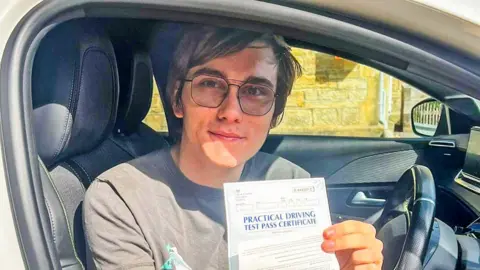Emer MoreauBusiness reporter

 Caitlin Graham
Caitlin Graham
Caitlin wanted to learn in an automatic car, but was forced to learn manual
Caitlin Graham wanted to learn to drive in an automatic car as she hoped the test would be quicker to pass without having to get to grips with a gear box.
But the 22-year-old says she had little choice but to learn in a manual due to any available automatic instructors being more than 20 miles away.
Motorists have seen a quiet shift in how they drive in recent years - with one in three cars on UK roads now an automatic.
A quarter of driving tests in England, Scotland and Wales last year were taken in automatic cars.
The AA says the trend is being driven by the UK's ban on the sale of new petrol and diesel cars coming in 2030, as elecric cars do not have manual gearboxes.
For new drivers, this presents a dilemma - whether to learn and take their test in an automatic or a manual car.
Boxed in
It is a decision that could affect the rest of their driving lives - pass your test in an automatic and you will forever be boxed into only driving automatics - or indeed electric vehicles. Pass in a manual, and you will have the freedom to pick and choose.
But many young people say it is not a decision they are freely able to make. Some would-be automatic learners have complained about a lack of instructors and the higher cost of lessons.
Others feel the jeopardy of learning in a manual is just too high. With huge competition for driving test slots, and long waits to re-take for those who fail, some young drivers feel learning in an automatic is the only way out of the fail-rebook, fail-rebook doom loop.
When Caitlin moved back home to a "super rural" part of Cumbria after university she was eager to pass her driving test as quickly as possible. There is no public transport in her village and she wanted to get on with finding a job.
But unable to get hold of an automatic instructor she went for manual and passed almost a year after her first lesson. She says it only took her sister, who learned to drive in Newcastle-upon-Tyne, five months to pass in an automatic.
But it is a common misconception that the automatic test is easier - the pass rate for the manual test is higher at 50.4% than automatic at 43.9%, according to Driver and Vehicle Standards Agency (DVSA) figures for the financial year ending 2025.
"People still need to make the right decisions at the right time - make the correct observations at the right time and drive at appropriate speeds," says Stewart Lochrie, chairman of the Approved Driving Instructors National Joint Council (ADIJC).

 Cleo Moseley
Cleo Moseley
Cleo was anxious to pass her test first time
Cleo Moseley really weighed up the decision. "Automatic felt like the slightly easier option" but "manual lessons were cheaper," she says.
Automatic and electric cars tend to cost more to buy than manuals so instructors charge more to cover this, adds Stewart from the ADIJC.
For the same reason Cleo says: "I also didn't know if I would be able to afford an automatic car at the end."
The 25-year-old from Northumberland has decided to start learning in a manual.
"I did really think about it," she says. "Automatic cars are basically becoming the norm. But I don't see manual cars [being] the majority five, 10, 15 years from now, so I don't think everyone should learn manual."

 Luke Breaban-Cook
Luke Breaban-Cook
Luke passed his driving test in a manual
For Luke Breaban-Cook the decision was pretty much made for him - he has just passed his test after learning in his parents' manuals.
"They were the only cars available to me," says the 18-year-old from Battle in East Sussex.
"I didn't want to get my own car as it was too expensive," he adds. "Plus I'm moving to London for uni and I'm not planning on driving there."
Luke found clutch control difficult at first. "I stalled once in my test," he says, but he still passed first time.
Luke does nott think every learner should do a manual test: "Even if there is a chance that you might have to drive a manual courtesy car or rental car, that chance is getting smaller and smaller."

 David Robinson
David Robinson
David is dyspraxic and thought an automatic would be easier for him
For some people with disabilities automatic cars can be more accessible.
David Robinson, who's 29 and from Cardiff, booked his driving test in September and has to wait until February to take it.
He opted to learn in an automatic because he has dyspraxia, which affects movement and coordination.
"It just seemed like a better idea because I didn't want to have to balance the clutch, the brake, the accelerator, check the revs, make sure I'm getting into the right gear," he says.
David hasn't ruled out getting a manual licence in future, but he says he would wait and see what happens after the ban on new petrol and electric cars takes effect in 2030.
"It might be that in five years I don't see the point," he says.
While the number of driving tests in automatic vehicles continues to rise, the vast majority of instructors are still teaching in manual cars," says Stewart from the ADIJC.
"This will change eventually, as the price of EVs continues to decrease, and driving instructors begin to see the commercial advantages of teaching in these kinds of vehicles."
But for now there's a stigma around an automatic-only licence, says motoring journalist and author Maria McCarthy.
"People would say, oh, one day you might need to hire a van or hire a car on holiday and then you'll need to drive a manual.
"But these days when you hire a car or a van, most of them are electric. And how often do people do things like that anyway?"
Caitlin's instructor did eventually buy a second automatic car but at that stage she had "already committed lots of time to manual".
She passed her test in September and now she's behind the wheel of her manual 2018 Volkswagen T-Roc and an hour to her new job in Workington, she has no regrets.
"If I'd had the choice back then an automatic would have been the dream," she says. "But now I'm glad I learned manual because I can drive any car and the insurance is cheaper."
Additional reporting by Connie Bowker

 12 hours ago
3
12 hours ago
3

















































